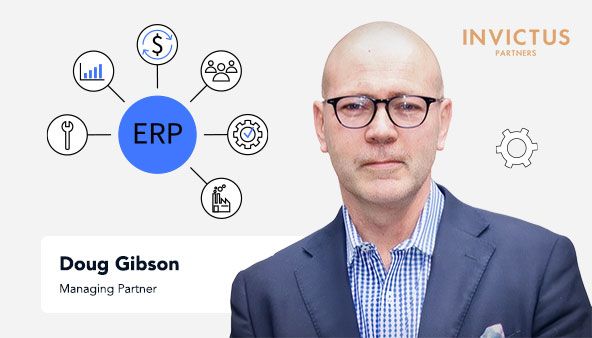Tell us about your professional journey and what inspired you to start Invictus Partners?
Doug: I started in retail and transitioned through roles at IBM, Oracle, and SAP before co-founding Invictus in 2014. I formed the company to level out the playing field between the software vendor and customer and help clients become the “masters of their fate”. Organisations would often feel frustrated by the lack of clarity around enterprise software contracts and, as a result, end up spending tens if not hundreds of thousands of dollars on unnecessary licence and support costs. At Invictus, we serve as a client advocate, focusing on helping them to avoid overspending and gain leverage in negotiations with software vendors.
Can you share a real-world example or story that illustrates the impact of your work?
Doug: Okay, sure. We had an organisation embarking on a cloud-based ERP transformation that faced a far higher-than-expected price tag. The initial vendor quotes were steep, and cloud discounts weren’t as aggressive as in on-prem environments, putting the project at risk. Invictus worked with the client to reassess their bill of materials, project scope, timeline, and contract structure. By re-architecting the deal based on actual needs and phasing, we were able to better align the solution with business priorities and budgets, unlocking 35% in savings.
That’s a fantastic result. I am interested to hear more about how you help organisations choose an ERP.
Doug: We do a lot of work around assisting organisations to navigate ERP selections and optimisations. We help our clients understand their goals, assess the current ERP landscape – including composable ERP options – and strategically plan their approach. This often involves considering modular ERP approaches and best-of-breed solutions. Our involvement can span the entire process, from initial assessment to deal negotiation and SI selection.
Could you expand on your thoughts about modular ERP?
Doug: Absolutely. When organisations start looking at a new ERP, it’s often because they’ve been running the same platform for 20 or even 30 years. That means they’re not just replacing software – they’re making a once-in-a-generation decision that will shape how the business operates for the next decade or more.
That’s why we encourage clients to consider a modular or composable ERP approach rather than defaulting to a single monolithic platform. The reality is: no vendor excels at everything. Some are strong in finance, others in HR, or supply chain. The idea that one system can do it all—and do it well—is increasingly outdated, especially in the cloud era.
With modular ERP, organisations take a core platform that’s fit for purpose, and then build around it with best-of-breed solutions or custom applications – what we call “edge systems.” This provides flexibility, reduces lock-in, and enables different parts of the business to evolve at varying speeds.
When advising clients on reducing their Total Cost of Ownership, how do you see low-code platforms fitting into the picture?
Doug: Application-agnostic platforms play a critical role in reducing Total Cost of Ownership (TCO), especially as organisations move from legacy ERP systems into more modern architectures.
A key driver of high TCO is the sheer volume of customisations embedded in traditional ERP platforms. These customisations make ongoing support, integration, and upgrades far more expensive. For instance, SAP customers with heavily customised systems often face challenges when migrating to S/4HANA. Every change has a ripple effect, complicating patching, testing, and deployment cycles.
That’s where application-agnostic platforms add strategic value.
Instead of building new customisations directly inside ERP platforms (like SAP, Oracle, or Workday), we advise clients to abstract that logic into an agnostic platform. This creates a central complementary layer for building and maintaining composite apps, workflows, and integrations that keeps your core system clean.
From your experience, what are the main benefits of “cleaning up” core systems and building new applications to support specific business operations?
Doug: This approach brings several benefits, including standardisation across platforms – rather than fragmenting logic across different vendor ecosystems – and reuse of digital assets and components – like purchase order workflows that work across SAP, Salesforce, and other systems. It also simplifies integration and leads to faster change cycles, with common skillsets and tooling across teams, reducing the cost of talent and training.
The idea is to build once, and reuse many times. With an agnostic platform sitting on open standards, organisations can create a digital asset repository—configurable, composable building blocks that reduce rework, improve agility, and ultimately drive down long-term costs.
And driving down costs means there’s more money to spend on other things, right?
Doug: Exactly. One of the most powerful outcomes of reducing TCO is that it frees up budget to fund transformation and innovation.
We’ve worked with clients who were excited about launching new projects but said, “We just don’t have the budget.” In many of those cases, we’ve gone in, analysed their software licensing, cloud spend, and overall technology real estate—and found significant savings. Those savings have then gone directly into funding the initiatives they thought they couldn’t afford.
It’s not just about cutting costs for the sake of it. It’s about being smarter with what you already have. Budgets are under more pressure than ever, and IT leaders are expected to deliver more with less. So we help them find efficiencies—whether it’s through consolidating platforms, reducing unnecessary licensing, or shifting to more cost-effective delivery models like agnostic platforms and composite applications.
With these modern approaches, not only is the cost of ownership lower, but delivery is also faster. So the value is realised sooner, and your budget stretches further.
Thanks Doug for your insights.
Doug: Pleasure to talk with you.


